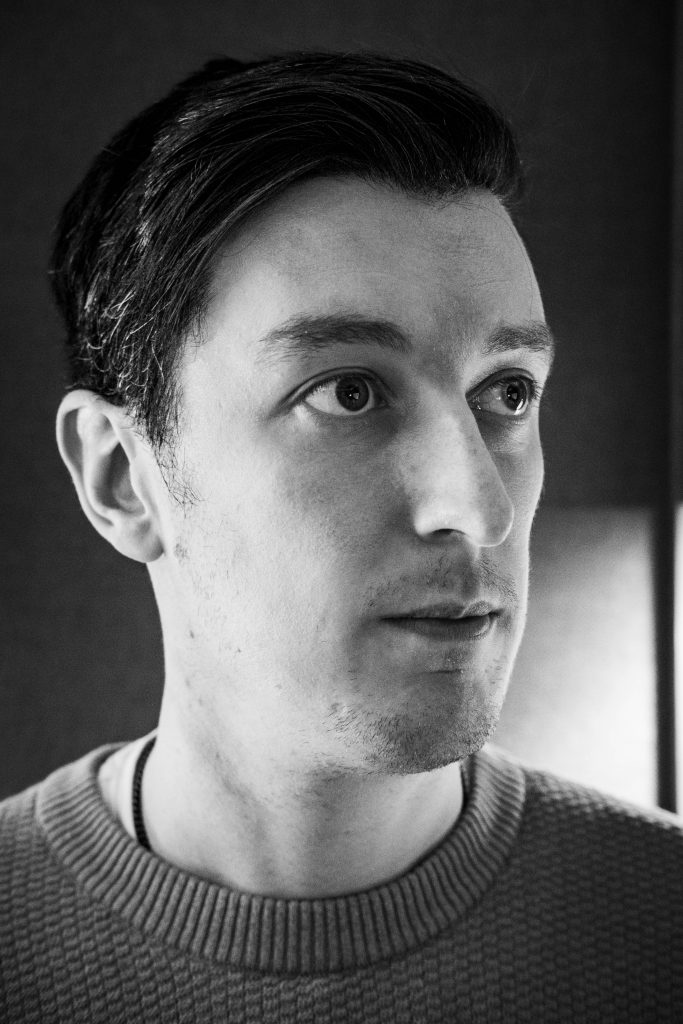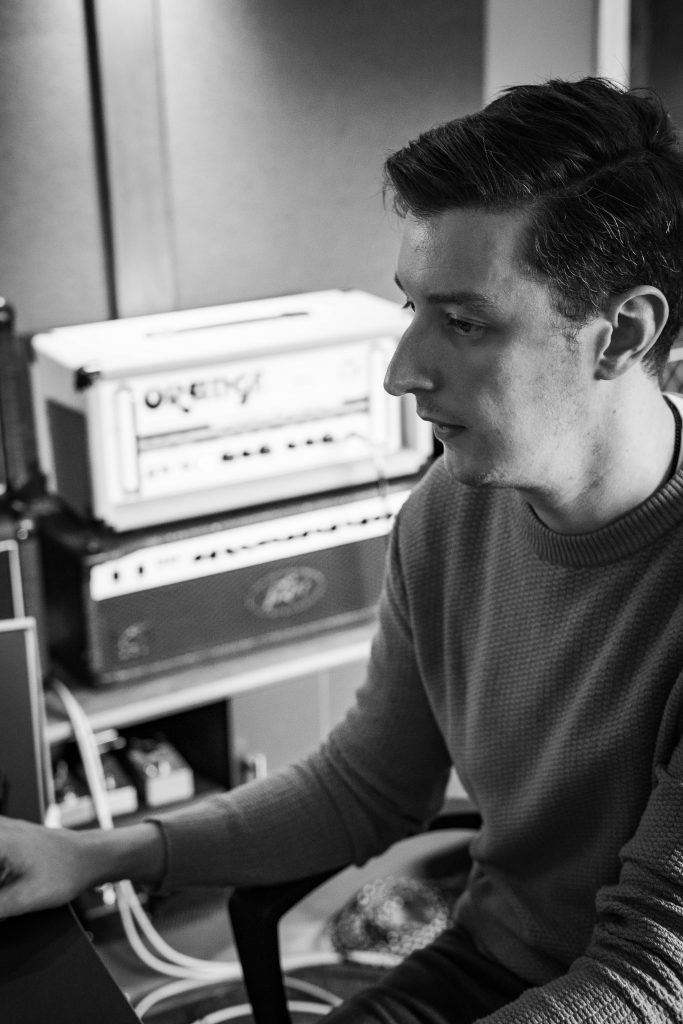Gareth is a music producer based in Wigan. He has worked with artists such as The K’s, The Lottery Winners and Frank Turner. Over a decade ago he built his recording studio, The Lounge, from scratch and has gone on to produce some of the best new music in the UK indie scene.
What made you want to be a producer and start your own studio?
When I left college, I had been in bands and stuff, and I thought I wanted to do that side of things but I was doing cover gigs and stuff from a really young age, so when I was 18 or 19 I’d already been gigging for 6 or 7 years. I felt like I’d kinda been there and done that already. One of the bands that I was in won a battle of the bands, where we won a recording session and I’d never been in a studio before. It was only a straight-forward studio – nothing mega. But as soon as I went in there I thought “right okay, this is what I want to do. Whether I’m in a band in the studio or a producer in the studio, I just want to be in the studio”. So that’s when I then started doing demos at home and then steered my uni choices to go and do that. So it was just a natural progression from being in a band, to be honest.

Do you find producing allows you to be more creative than playing in a band?
I think it’s a different kind of creativity. Sometimes when you’re playing in a band, you have 4 or 5 brains coming together inside 4 walls, and it becomes a melting pot. I like giving that outside opinion now, where a band have been in the melting pot together and feel they’ve got the music to where they want it, then they take it to someone who’s never heard the tune before and go “what do you think of this?”
It’s horrible at times because a band might have worked on a tune for years and when they bring it to you, you’re like “I don’t like that bit” or “that bit needs to change” or whatever, but sometimes a band just needs that because they’ve been stuck in it for that long and have the blinkers on.
What’s been your proudest moment as a producer so far?
The proudest thing for me is when I go home and see that I’ve got a wife, I’ve got a house, I’ve got kids, I’ve got a car, and all the rest of it, and my half is all paid for by doing this job. If I get stuck in a rut wondering “am I any good at this?” I look around and think “well I must be doing something right” because I’m still here 10 years later. I’ve not had to give up the pipe-dream yet.
Can you explain what the loudness wars are, and how have they affected your work?
Before regulations were brought in, bands just wanted to stand out on the radio, so if you’re song is louder than the one before it’s more likely to make someone’s ears prick up who might not have been intently listening to the radio because your song sounds louder or more exciting than the track that was just on.
Nowadays it’s regulated, but a lot of people get scared by that. Nowadays Spotify and YouTube have got noise penalties, so if your tune is above a certain level of LUFS [units for loudness], then they’ll turn it down. A lot of mastering engineers got spooked when these regulations came in because they thought their masters were going to get squashed even more and so they’d just start to master to whatever level Spotify would tell them to, which was around -14 LUFS. But -14 LUFS is super quiet, so a lot of mastering engineers found that the music no longer sounded exciting. But a lot of mastering engineers grasped it pretty quickly and carried on mastering as normal, even if it meant mastering to around -4 LUFS which is insanely loud, then they’d just take the noise penalty because the music would still sound exciting and energetic even if it got turned down. Sometimes that squashing and pumping sound [from sound compression] is part of the feel of the track. A good example is Mantra by Bring Me The Horizon. When that kicks in it feels like your speakers just swallow in on themselves. There’s no way that that’s mastered to Spotify’s regulations. It’s super super loud and it just gets turned down, but who cares?

What do you think it takes for an original musical artist to be successful in this day and age?
The hard thing for creative people doing their own stuff these days is that not only do you have to be good at writing music, playing your instrument and performing live, but you have to be a social media expert as well, which is horrible but it just has to be done. To the point where record labels look at it. They might like a band or an artist, but they’ll go “but they’re rubbish on TikTok so we’re not interested”, which is awful but it’s just the way the world’s going. Because now you get some [bands] as well where they’re absolutely brilliant on TikTok and Instagram, but terrible live and write awful tunes, and they’ll still get a record deal because they’re getting an insane amount of TikTok likes. But I think there’s a lot to be said for organic popularity. Someone who’s amazing on TikTok and all that kind of stuff is more likely to be a flash in the pan. Yeah you might get millions of likes and your streams might go mad of Spotify for a bit and you get a few big shows, but as soon as the next TikTok person comes along you’ll be forgotten, unless you’ve got the songs that last. Whereas if you’re a band that can push through and get noticed and build a big fanbase organically, like The K’s who’ve not released an album yet* and are selling out 2 and a half thousand capacity venues and playing main stages at festivals, then as long as they keep releasing then the fanbase will stay with them and won’t drop them just because another band has come along.
You need patience – don’t try and be that flash in the pan thing, unless you want to be an influencer or something. If you want to be an artist that lasts, you’ve got to be prepared to be in it for the long haul. I also think with any style of music, one of the biggest you can have in your toolbox is to just listen to as much music as possible. It makes you a better songwriter, producer and player. It just broadens your palette so much. People pigeon hole themselves so much like “I’m a metal head” or “I’m a punk” or whatever, but they’ll probably only get good at writing those kinds of tunes. Whereas bands that last a long time have to evolve a bit and pull in inspiration from different genres, so I think having a broad palette is a big thing.
What do you think of the local music scene in Wigan and what type of music is thriving there?
There’s something in the water in Wigan at the minute. If you go back 15 years ago, Wigan had a strong music scene then and there were venues everywhere. You could go into 10 different places in Wigan on a Friday or Saturday night and there’d be live music on, whether it’d be originals or covers. And then all that started to stop and it died off big time and you kind of had to go into Manchester or Liverpool. Then probably 5 to 6 years ago it started to come back and I think places like The Old Courts have got a lot to take credit for with that. They were giving a stage to young up and coming bands and then bands like The Lathums took off and that brought some attention to Wigan. Obviously you’ve got The Lottery Winners, who I know aren’t technically from Wigan but are kind of in the same borough. Loads of bands just started the emerge, The Stanleys, The Facades. I mean there’re just loads of bands in Wigan.
*Due to an unforeseen glitch in the hyperdrive, this interview was inadvertently stranded in the digital abyss for several months. Following this interview, the K’s went on to release a #3 album produced by Gareth in the UK’s official human album charts. Gareth must have been on to something there.
